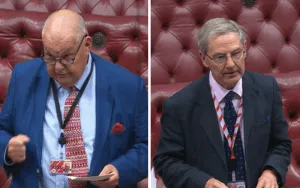The disabled boss of the charity that oversees the Motability car scheme has finally hit back at months of “hostile”, “harmful” and inaccurate media reports and online comments about how it is run and its disabled customers.
Nigel Fletcher (pictured), chief executive of Motability Foundation*, agreed to make a statement to Disability News Service (DNS) this week in response to the “unprecedented level of misinformed, misrepresented and often hostile” commentary that has appeared online and in the media.
He said he believes that the current “climate of stigmatisation” of disabled people “risks rolling back decades of progress in promoting disability inclusion and understanding”.
Fletcher said: “It creates an environment where disabled people are scrutinised and made to feel they must justify their right to mobility and participation. This is unacceptable.”
Recent coverage includes reports of comments made by Conservative leader Kemi Badenoch, who claimed that new Motability vehicles are handed out to people with food intolerances.
Other reports have suggested that Motability vehicles are handed out “free” – rather than in exchange for most or all of the higher rate mobility element of personal independence payment, and sometimes an additional advance payment – and with few if any checks on eligibility.
There have also been widespread reports in the media and on social media attacking Motability customers and accusing them of abusing the scheme.
Fletcher said it was “profoundly disheartening” to see disabled customers “being spoken about in such a dismissive and demeaning manner”, and he said the narrative suggesting widespread abuse of the scheme was “not only inaccurate but actively harmful”.
He said that a Motability vehicle was “not a luxury” but “a necessity for many and a testament to the power of a well-designed, robust system that genuinely empowers disabled people”.
He said the scheme was established to help disabled people with “significant mobility barriers, enabling them to access employment, education, healthcare and participate fully in society like anyone else”.
And he pointed out that eligibility was determined by entitlement to disability benefits, which were “assessed and awarded by the government, not by Motability”.
He also responded to statements – which Badenoch has repeated – about the number of vehicles provided through the scheme without any adaptations.
He said that about 12 per cent of the fleet are adapted vehicles and 20 per cent are leased by non-driving disabled people who have someone else drive on their behalf.
He said: “While for some customers standard production vehicles alone will enable them to drive, the fundamental need is the provision of a suitable, accessible vehicle that allows them to travel when public transport or other options are not viable due to their disability.”
Fletcher also corrected figures suggesting that one in five of all new cars sold in the UK are sold to Motability; he said this was now about one in seven.
He said: “What this truly reflects is the significant, unmet need for accessible transport within the disabled community.
“It underscores the success of a scheme that, for over 45 years, has provided unparalleled mobility solutions, transforming lives and fostering independence.”
His comments came as peers reacted with horror to a new website, supported by a right-wing journalist, which allowed people to check whether a new car belonging to “an annoying neighbour” was obtained through the Motability scheme.
During Tuesday’s debate on the government’s universal credit bill (see separate story), the disabled crossbench peer Baroness [Tanni] Grey-Thompson spoke of the “victim blaming” that disabled people had experienced during discussion of the government’s cuts.
She highlighted the “terrifying” website, which has temporarily been taken down – possibly because it had been reported to the police – and which she said “feels like it crosses a line to incitement”, with “despicable” replies visible on the website.
She said the Motability scheme had been the only way she could afford to learn to drive as a young disabled woman, when public transport was “even less accessible than it is now”.
She said: “In the media it is being portrayed as a free car, which it is not, and we should remember that over the years it has considerably helped the car industry.”
Another disabled peer, the former Liberal Democrat president Baroness [Sal] Brinton, attacked Badenoch’s suggestion that it was “possible for someone with a food intolerance to get a Motability vehicle”, which she said appeared to be an example of senior political figures “demonising” disabled people.
Baroness Sherlock, a work and pensions minister, told fellow peers that she had been “shocked” to hear of the website.
*Motability Foundation is a long-term DNS subscriber
A note from the editor:
Please consider making a voluntary financial contribution to support the work of DNS and allow it to continue producing independent, carefully-researched news stories that focus on the lives and rights of disabled people and their user-led organisations.
Please do not contribute if you cannot afford to do so, and please note that DNS is not a charity. It is run and owned by disabled journalist John Pring and has been from its launch in April 2009.
Thank you for anything you can do to support the work of DNS…

 Only 17 peers back disabled people on cuts, as leading Tory says living on benefits is ‘not a life of dignity’
Only 17 peers back disabled people on cuts, as leading Tory says living on benefits is ‘not a life of dignity’ Air travel accessibility report could lead to ‘tangible’ improvements, but progress depends on industry
Air travel accessibility report could lead to ‘tangible’ improvements, but progress depends on industry Badenoch silence after ‘ticking time bomb’ claim is exposed as a lie by official figures
Badenoch silence after ‘ticking time bomb’ claim is exposed as a lie by official figures